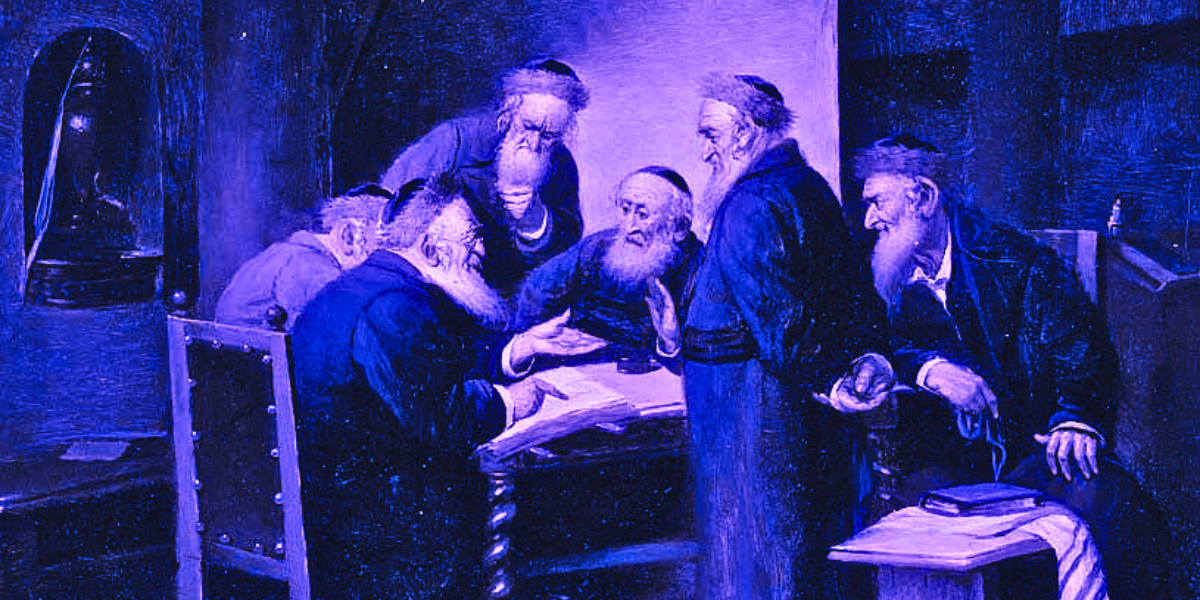About Hebrew
Litigators and the Law

From biblical times to the rabbinic era to the now temporarily forgotten uproar over the Israeli government’s attempted reform of the country’s Supreme Court, the Jews long have been immersed in questions of jurisprudence. Take the example of the Hebrew root ד–י–נ (dalet-yod-nun), to judge, which provides Hebrew terms for justice, verdicts, parking tickets, legal jurisdictions and a whole slew of other subjects for discussion.
The root appears over 100 times in Scripture. In Genesis 15:14, God uses the root to promise forefather Avram that, after 400 years of slavery in Egypt, דָּן אָנֹכִי (dan anokhi), “I will execute judgment,” on the oppressors and lead your descendants into the Promised Land. The Book of Esther 1:1 uses what medieval lexicographer David Kimchi suggests is a sister to our root, מ–ד–נ (mem-dalet-nun), which means nation or land, in its reference to the 127 מְדִינָה (medinah), provinces—the Hebrew singular is a plural here—that make up the Persian king’s domain.
Pirkei Avot, the Ethics of Our Fathers, enjoins judges to be מְתוּנִים בַּדִּין (metunim ba-din), “moderate in the administration of justice.” According to the Talmud, capital cases, דִּינֵי נְפָשׁוֹת (dinei nefashot), are judged by a court of 23 justices. In Israel today, civil cases dealing with דִּינֵי מָמוֹנוֹת (dinei mammonot), monetary law, can be adjudicated by a religious בֵּית דִּין (beit din), court, composed of three דַיָּנִים (dayyanim), judges, if the two בַּעְלֵי דִּין (ba’elei din), litigants, have agreed to abide by the גְּזַר דִּין (gezar din), verdict of the court.
Our root shows up in many other aspects of modern Israeli life, including in the term for parking ticket, דּוּחַ (du’ah), an abbreviation of דִּין וְחֶשׁבּן (din ve-heshbon), report.
When it was first published more than 60 years ago, Elie Wiesel’s Dawn was very much נָדן (nadon), under discussion, in book gatherings. The novella is a 100-page deliberation on what the famed writer, Nobel laureate and Holocaust survivor called “violence, hatred and death” in its introduction. In Dawn, set in British-controlled Palestine, the protagonist, a member of the Jewish underground, is ordered to slay a British hostage in response to the execution of a Jewish comrade who had been נִדּן (niddon), sentenced, to death. In a somber meditation vis-à-vis Jewish history and the future מְדִינַת יִשׁרָאֵל (medinat yisrael), State of Israel, the narrator spends the night—until dawn—weighing the specifically Jewish morality of this existential act.
In the face of communal or individual calamity, including a death and a war, Jewish tradition teaches that one should proclaim, בָּרוּךְ דַּיַּן אֱמֶת (barukh dayyan emet), “Blessed be the True Judge.” When one’s faith in God’s intervention wavers, however, one might choose, like Wiesel in his three-act drama The Trial of God, to take God himself to court.
Joseph Lowin’s columns for Hadassah Magazine are collected in HebrewSpeak, Hebrew Talk and his most recent book, Hebrew Matters, available at gcrr.org/product-page/hebrew-matters.








 Facebook
Facebook Instagram
Instagram Twitter
Twitter
Leave a Reply